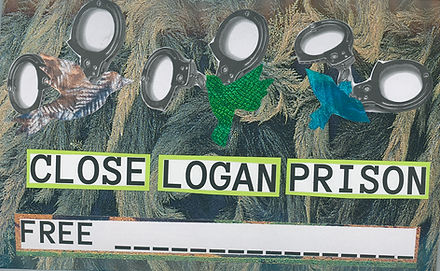Illinois should not be spending $900 million to rebuild prisons.

The No New Prisons Illinois Campaign is dedicated to preventing the construction of new state prisons in Illinois. As a coalition of formerly incarcerated and currently individuals, loved ones and community members, we are united in our fight against incarceration.
In 2024, Governor Pritzker allocated $900 million of Illinois residents' tax dollars to rebuild two prisons, intending to replace Stateville and Logan with what are described as “state-of-the-art, trauma-informed facilities.”
However, there is no such thing as a “trauma-informed” prison—prisons are inherently traumatizing. We are calling for no funds to be spent on building new prisons. Instead, we advocate for investing the $900 million into our people and communities.
Our Goals.
Stop the Rebuilds
We will stop the construction of new prisons in Illinois. We stand against the construction of any new prison, jail, juvenile detention facility, or immigration detention facility.
Close Logan C.C.
We will work intentionally to close Logan Correctional Center in a way that reduces harm during the closure and transfer process.
Decarcerate
The alternative to construction is decarceration. We will work towards dramatically reducing Illinois’ state prison population through advocacy to stop people from entering prisons, secure the humane release of people serving prison sentences, and provide non-carceral support for people released from prison.
Divest & Reinvest
We will work towards investing economic resources and land into and directed by directly-impacted communities.

We want safe communities. We do not need new prisons.


-
Prisons Do Not Make Us Safer: Incarceration is not an effective public safety strategy. Illinois already locks up more people than France, the United Kingdom, Canada and Portugal combined. Yet, we are not any safer.
-
There is No Such Thing as a Trauma-Informed Prison: Isolation from support systems, loss of autonomy, unpredictability, and exposure to violence are fundamental features of the carceral system that negatively impact mental health.
-
There is No Such Thing as a Gender-Responsive Prison: The vast majority of people incarcerated in women’s prisons have survived gender-based violence and are retraumatized by prison conditions that mirror the power and control dynamics in domestic violence relationships.
-
There is No Such Thing as a Programming/Education Prison: In Illinois, state funding for post-secondary education fell 46% between 2000 and 2023, while the DOC budget increased 22% between 2011 and 2020 (despite a decreasing incarcerated population). Prisons weaponize every facet of life inside, including educational programs. The only place working poor people can access excellent and free higher education should not be in a prison.
-
Prisons Siphon Our Tax Dollars from Life-Affirming Resources: Investments into so-called “rehabilitative prisons,” when these same services or free programs are denied to people in the world outside of prisons, make resources less available for non-incarcerated communities, particularly critical in 2025 as Illinois is losing federal funding for education, substance abuse treatment, and public health programs.
-
Prisons Are a Matter of Racial and Economic Justice: Prisons disproportionately incarcerate people of color and poor and working-class people and then extract resources from socially marginalized communities, who shoulder the costs of communicating with, visiting, and providing financial support to incarcerated loved ones.
-
Our Loved Ones Are in these Prisons: Every incarcerated person is someone’s sister, brother, father, mother, cousin, lover, auntie, or friend. The trauma of incarceration ripples outward, affecting children, families, communities, and the broader social fabric.
-
Prison Guard Work is Not a “Good Job”: Working in a prison is harmful and traumatic. Prison guards experience shorter life expectancy and report high rates of depression, PTSD, anxiety, and self-harm due to their working conditions. These stressors spill over into guards’ families and homes, contributing to conflict and domestic violence.
-
We Have Been Here Before: Decades of reforms, often pushed with “good intentions,” have landed the U.S. and IL in this current mess: inhumane conditions are the norm across IDOC prisons. Illinois has proved it cannot humanely incarcerate people.
-
We Can Do Better. We Can Be Creative. We Can Imagine and Build Something Different: Closed prisons can become farms, museums, sites for teaching and learning, or other kinds of anchors for multigenerational employment or community building. Land could be returned to Indigenous stewardship.
Rather than spend $900 million rebuilding prisons, Illinois should invest those funds into healthcare, counseling, drug treatment, housing, education, vocational supports, libraries, a dedicated reentry fund, guaranteed basic income programs, and creating a real social safety net. These investments will strengthen communities, decrease the number of people entering prison, and break the cycle of re-incarceration.
YES - these prisons should close.
For years, incarcerated people have documented and raised concerns about the hazardous conditions at Stateville and Logan prisons - including toxic mold, unsafe drinking water, insufficient temperature controls, environmental health hazards, noncompliance with the Americans with Disabilities Act, and crumbling buildings - that kill people.


NO - Stateville and Logan prisons should NOT be rebuilt.
Investing a minimum of $900 million to build two new prisons the state does not need is fiscally irresponsible, will not increase public safety, and is harmful to Illinois communities. Gov. Pritzker and IDOC’s plan is an investment in incarceration, not rehabilitation. Actual investment in trauma-informed and gender-responsive supports requires looking beyond the prison and investing in communities.
Endorsed By

Contact Us
Instagram @nonewprisons.il


